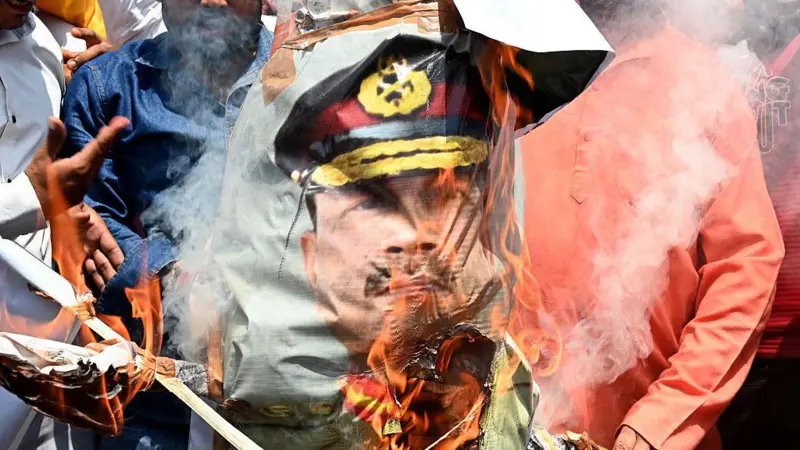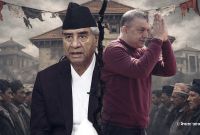Kashmir Bloodshed Ignites Nepal: Close Pak Embassy Over Terror Allegations!

Kathmandu – Pakistan's Army Chief, General Asim Munir, who generally avoids the spotlight, has become a subject of intense discussion in recent weeks, not only within Pakistan but also across the border in India and other diplomatic circles. His strong comments regarding India-administered Kashmir, followed days later by a deadly militant attack in Pahalgam, have escalated regional tensions, sparking significant repercussions and reactions within Nepal. Following the attack, which claimed the life of a Nepali student among 26 others, protests against Pakistan have erupted in Nepal, accompanied by demands to close the Pakistani embassy in Kathmandu.
Background: General Munir's Comments and the Pahalgam Attack
During an event in Islamabad on April 17, General Munir reportedly stated, "We are different from Hindus in every way," referring to Kashmir as Pakistan's "jugular vein." He also pledged that Pakistan would "never abandon Kashmiris in their valiant struggle against Indian occupation." Analysts viewed these remarks as provocative.
Five days later, on April 22, suspected militants opened fire on tourists in Pahalgam, India-administered Kashmir, killing 26 people. Among the victims was Sudipani Neupane, a Nepali student studying at Far-Western University. India accused Pakistan-backed militant groups of responsibility for the attack, a claim Pakistan denied. However, the timing of General Munir's pre-attack comments has fueled mistrust in India and raised fears of potential Indian military retaliation.
General Munir: Background and a Shifting Military Doctrine?
General Munir, who became Army Chief in November 2022, is the son of an Islamic scholar and school principal and is also a 'Hafiz' (one who has memorized the Quran), a rare distinction among senior Pakistani army officers. His four-decade military career includes commanding troops near the sensitive northern border close to Kashmir and heading the intelligence agency (ISI).
His style is considered different from his predecessor, General Qamar Javed Bajwa. Bajwa favored 'silent diplomacy' with India and de-escalated tensions during the 2019 Pulwama crisis by returning captured Indian pilot Abhinandan Varthaman. However, analysts suggest General Munir faces immense pressure from rising terrorism, political instability, and economic crisis, compelling him to take a harder stance. His February remarks about being "ready for 10 more wars for Kashmir" are seen as indicative of this tougher policy. Within Pakistan, he is also viewed as reasserting military authority, notably through an unprecedented crackdown on supporters of former Prime Minister Imran Khan (currently imprisoned) following riots in May 2023.
Reaction in Nepal: Protests and Demand for Embassy Closure
In response to the Pahalgam attack and the death of the Nepali citizen, the National Unity Campaign recently organized a protest rally from Simara in Bara district to Birgunj in Parsa district. Despite attempts by security forces to obstruct the rally, protestors reached Ghantaghar in Birgunj, chanting slogans like "Pakistan is the birthplace of terrorism" and "Down with Islamic terrorism." They paid tribute to the deceased, including the Nepali student, observing a minute of silence.
Campaign Chairman Vinay Yadav, speaking during the protest and later in a separate statement, demanded the immediate closure of the Pakistani embassy in Nepal. Yadav leveled serious allegations, accusing the embassy of promoting terrorism, fostering anti-social activities, obstructing Hindu religious activities, and posing a security threat to both Nepal and India. He expressed dissatisfaction with the Nepal government's perceived silence on these alleged activities and voiced concerns over the entry of Rohingya refugees and other "anti-social Muslims," calling for scrutiny of the citizenship of all Muslims residing in the country. Yadav also criticized Nepal's Muslim Commission, deeming it contrary to secular principles.
Further Allegations Regarding Embassy Activities
Meanwhile, separate reports have surfaced alleging that the Pakistani embassy in Maharajgunj, Kathmandu, regularly hosts events for high-profile Nepali politicians, activists, academics, and journalists. These reports claim that anti-Hindu and anti-India documentaries are screened at these gatherings, and participants are offered Pakistani hospitality, including food, alcohol, and potentially some form of remuneration. These alleged activities are portrayed as an influence operation extending beyond typical community support.
Conclusion
The regional tension, fueled by General Munir's perceived aggressive rhetoric and the tragic events in Pahalgam involving a Nepali citizen, has clearly spilled over into Nepal. The public protests and serious demands for the closure of the Pakistani embassy highlight the potential impact on Nepal-Pakistan relations and internal social harmony. As of now, there has been no official response from the Pakistani embassy or Nepal's Ministry of Foreign Affairs regarding these allegations and demands. How this situation is addressed in the coming days will likely have far-reaching consequences for regional relations and stability.





![From Kathmandu to the World: How Excel Students Are Winning Big [Admission Open]](https://nepalaaja.com/img/70194/medium/excel-college-info-eng-nep-2342.jpg)


